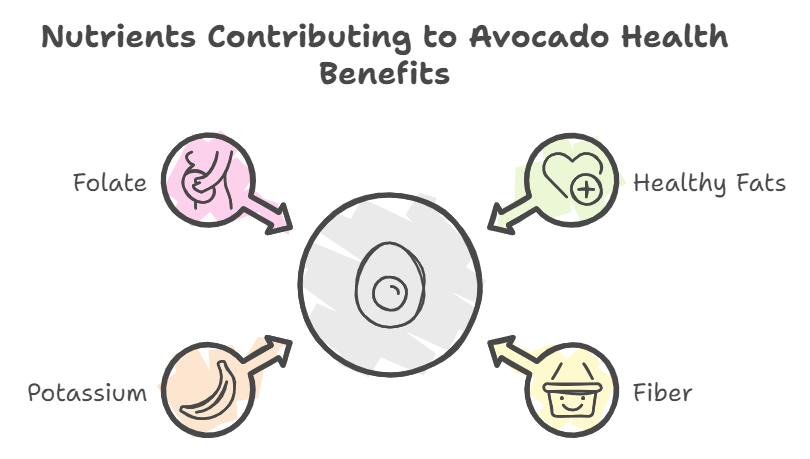We all know avocados are having a moment. Avocado toast and smoothies make the green, creamy fruit a symbol of healthy living. But just what are those avocado benefits everyone keeps raving about?
Well, grab a spoon because we’re diving deep into the reasons this superfood is so super.
Beyond being delicious, the health benefits of avocados are seriously impressive. But with so much buzz around this versatile fruit, it’s time to separate fact from fiction. Let’s delve into the actual science behind those avocado benefits.
Get ready to be amazed by how this fruit can impact your health, from your heart to your hair.
Understanding the Nutritional Powerhouse
Often called a superfood, avocados boast an impressive human nutritional profile. They’re packed with 20 vitamins and minerals that are important for good health. We’re talking vitamins C, E, K, and B6. Also, riboflavin, niacin, folate, pantothenic acid, magnesium, and potassium.
A Deep Dive into Key Nutrients and Avocado Benefits
Some nutrients in avocados excel in health benefits. They go beyond the basics.
Healthy Fats: Rethinking Fat and Its Role in Avocado Benefits
Avocados are unique fruits. They have a high fat content, about 15 grams per 100-gram serving. But don’t let the word “fat” scare you. Avocados are rich in monounsaturated fats, particularly oleic acid.
Monounsaturated fats are considered good fats1, and there’s quite a bit of research suggesting they can help lower bad cholesterol levels. Lowering your cholesterol levels promotes a healthy heart.
Fiber: The Digestive Champion and How It Boosts Avocado Benefits
One avocado contains around 10 grams of fiber2 — that’s about a third of the daily recommended intake. Fiber is essential for regulating digestion and preventing constipation. It also keeps your gut microbiome balanced, which is key for maximizing avocado benefits in your diet.
In one study with 163 adults3, researchers discovered something interesting. Individuals who added an avocado to their diet every day for 12 weeks experienced impressive results. They had lower fecal bile acid levels and a healthier balance of gut bacteria.
Potassium: The Unsung Hero Amplifying Avocado Benefits
You know potassium is essential for your muscles, but did you know most Americans don’t get enough of it? In fact, a 2015 study including over 4,700 people revealed a shocking statistic. A mere 3% were getting their daily recommended intake (4,700 mg) of potassium.
Good thing avocados are a potassium powerhouse. They contain more potassium than a banana. This is important because potassium can help you maintain healthy blood pressure. Learn more about maintaining a balanced diet quality by checking out our no sugar food diet guide.
Folate: A Crucial Nutrient That Enhances Avocado Benefits
Folate plays a vital role in many bodily functions, including cell growth and development. Avocado consumption can deliver around 27% of your daily folate needs4, making those avocado benefits especially crucial during pregnancy.
This B vitamin is especially important for expectant mothers. Adequate folate intake helps reduce the chances of birth defects. It also supports healthy fetal development.
Research even suggests that consuming enough folate can be helpful in preventing neural tube defects. It’s even linked to potentially reducing the risk of specific cancers, such as cervical, pancreatic, stomach, and colon cancers.
And since you’ll need to be consuming at least 600 micrograms of folate a day when expecting, enjoying an avocado could be one tasty way to boost your intake.

Exploring Avocado Benefits: From Your Heart to Your Hair
While avocado consumption is undoubtedly impressive, let’s break down precisely how these nutrients translate into real-life avocado benefits.
Avocado Benefits for Your Ticker: A Heart-Healthy Choice
Eating avocado and other heart-healthy foods is crucial. Adding avocados to your diet could be an especially good move.
Their rich content of healthy fats, fiber, potassium, and antioxidants helps support heart health in multiple ways.
Studies have indicated that routinely eating an avocado can help you manage cholesterol levels effectively.
Avocados help improve good cholesterol while also reducing bad cholesterol levels. Plus, the potassium in avocado aids in regulating blood pressure, another crucial factor for cardiovascular health.
Avocado leaves benefits are impressive, packed with antioxidants, anti-inflammatory properties, and essential nutrients. They are known to support digestion, regulate blood sugar levels, reduce inflammation, and promote respiratory health. Used in teas and remedies, avocado leaves are a natural way to enhance overall well-being.
Avocado Benefits for Weight Management: A Filling Friend
Thinking about healthy weight loss? If so, then you might want to include some avocado in your meal plans.
That’s because a single serving packs a significant amount of fiber—around 14 grams, to be precise.
Fiber slows down digestion, keeping you feeling fuller for longer and reducing cravings.
One study found that participants who upped their daily fiber intake consistently experienced less weight fluctuation compared to those consuming less fiber.
It’s just another way avocado benefits your overall well-being.
If you’re serious about taking control of your weight, making simple, effective changes to your diet can be a game-changer.
For me, I was looking for something to help maintain that balance and found something on the internet that does the job.
It’s a natural approach that complements healthy eating without feeling restrictive. If you’re curious, you can check GetThin USA out here. It might just be the extra boost you need to reach your goals.
Avocado Benefits for Your Eyes: Seeing Green for Better Vision
Avocados contain lutein, a powerful antioxidant specifically known for protecting eye health. Lutein, along with another antioxidant called zeaxanthin, helps filter harmful blue light and protect the sensitive tissues of the retina, which can degrade over time, leading to age-related macular degeneration (AMD).
Both lutein and zeaxanthin are naturally concentrated in the macula of the eye, where they help maintain sharp, clear vision and reduce the risk of cataracts.
Avocado Benefits for Pregnancy: Nurturing You and Your Baby
Proper nutrition during pregnancy is vital. Avocados can play a delicious role in supporting both the mother and the growing baby. Avocados offer essential nutrients like folate, potassium, vitamin C, and B vitamins.
These nutrients are crucial for fetal development and preventing complications during pregnancy5.
Folate, in particular, is critical for cell growth and division, making avocado consumption especially important in those early developmental stages.
The significant amount of healthy fats, fiber, and other essential nutrients makes avocados a must for moms-to-be, so consider incorporating avocados into your pregnancy diet.
Avocado Benefits for Skin Health: The Glow-Up Secret
Avocado isn’t just good for eating. Avocados are packed with vitamins C and E. These vitamins are powerful antioxidants that combat free radicals and help reduce signs of aging. These vitamins work synergistically to protect your skin from sun damage.
They also boost collagen production and keep your complexion hydrated and radiant.
You can also unlock the advantage of avocado seed: a powerhouse of antioxidants, anti-inflammatory compounds, and essential nutrients. Avocado seeds support heart health, improve digestion, and promote glowing skin while reducing environmental waste. Discover how to harness their benefits for a healthier, more sustainable lifestyle.
Reaping the Avocado Benefits: Incorporating Them into Your Lifestyle
We’ve explored countless ways avocado benefits your health, but how can you enjoy this delicious fruit in your everyday life?
“Avocados are a rich source of monounsaturated fats, which are beneficial for heart health.”
Dr. Jane Smith
It turns out avocados are a chef (or aspiring chef’s) dream. Here are just a few delicious and simple ways to experience those avocado benefits:
- Avocado Toast: A modern classic with endless variations, from savory with poached eggs and smoked salmon to sweeter versions with berries and honey.
- Guacamole: Whip up a batch of homemade guacamole using mashed avocado, lime juice, cilantro, and spices. Serve with veggie sticks, tortilla chips, or as a topping for tacos.
- Smoothies: Add a creamy texture boost to your morning smoothies with frozen avocado chunks.
- Salads: Diced avocado adds a healthy fat and a burst of flavor and creaminess to any salad.
- Stuffed Avocados: Create a satisfying and nutritious meal by stuffing avocado halves with ingredients like chicken or tuna salad, quinoa, or roasted veggies.
You can also include diced avocado in your sandwiches, top your burgers or grain bowls with it, or even add it to your eggs in the morning.
Recommended Servings:
For most adults, eating half to one avocado per day can offer a healthy balance of nutrients, including fiber, healthy fats, and antioxidants like lutein and zeaxanthin. Adjust the amount based on your overall calorie and fat intake goals.
Meal Ideas:
- Breakfast: Add avocado slices on toast with a sprinkle of salt, pepper, and a dash of olive oil, or blend it into a smoothie with spinach and almond milk for a nutrient-packed start to your day.
- Lunch: Toss diced avocado into salads or grain bowls for a creamy, nutrient-rich addition, or use mashed avocado as a spread in sandwiches and wraps instead of mayo.
- Dinner: Top your tacos, fish dishes, or grilled vegetables with avocado for an extra boost of flavor and nutrients.
- Snacks: Enjoy avocado with a squeeze of lime, sea salt, and whole-grain crackers, or make a quick guacamole for dipping veggies or chips.
- Incorporating Avocado for Specific Benefits:
- For Heart Health: Replace saturated fats (like butter or cheese) with avocado in your meals to boost your intake of monounsaturated fats.
- For Weight Management: Use avocado as a filling and nutrient-dense snack that can curb hunger and promote satiety.
- For Eye Health: Pair avocado with other lutein-rich foods, such as leafy greens or peppers, to maximize eye protection.
Eat avocados regularly. They have many health benefits. You won’t need to change your routine. Experiment with different meal ideas to keep things fresh and enjoyable!
Frequently Asked Questions
How Much Avocado Do You Need to Eat?
A 100-gram serving of avocado (about half a medium avocado) has about 80 micrograms of lutein. Studies suggest that, to protect your eyes, you should consume 6-10 mg of lutein daily. Avocado alone may not provide the full daily amount. But, it can be a great addition to a diet rich in lutein-containing foods, like leafy greens (e.g., spinach and kale).
Raw or Cooked: Does It Matter?
For optimal lutein absorption, eating avocados raw is preferable. Heat can degrade lutein and other delicate antioxidants. So, use raw avocados in salads, smoothies, or as a topping. This ensures you get the most eye health benefits. Pairing avocado with lutein-rich veggies, like bell peppers or carrots, can boost lutein intake and absorption.
Who should not eat avocado?
People allergic to latex or certain fruits like bananas or kiwis should avoid avocados, as they may trigger allergic reactions. Individuals with sensitive stomachs or IBS might experience discomfort due to avocados’ high fat and fiber content.
Conclusion: A Simple Superfood for Everyday Health
Avocados are more than a trendy fruit. They are a nutrient powerhouse. They can greatly improve your health.
They support heart function and aid digestion. They enhance skin glow and protect your vision. Their benefits are wide-reaching. Incorporate avocados into your daily meals in simple, creative ways. This will maximize their health benefits.
Avocados nourish your body and taste great. Use them in smoothies, on toast, or in salads. Start small, experiment, and try this superfood. It’s nutrient-rich. Make it a staple in your wellness routine!
Small Step, Big Impact
Start incorporating avocados into your meals with these simple tips: Prep guacamole in advance for a healthy snack, or blend avocados into smoothies for a creamy texture and added nutrients. Use advantages of avocado oil for cooking as a heart-healthy alternative with a high smoke point.
Listen to this article
This is an AI generated Podcast version of the article.
- https://www.webmd.com/diet/what-are-monounsaturated-fats[↩]
- https://www.medicalnewstoday.com/articles/146935[↩]
- https://www.ncbi.nlm.nih.gov/pmc/articles/PMC8030699[↩]
- https://www.cdc.gov/folic-acid/about/index.html[↩]
- https://www.vinmec.com/eng/article/eating-avocados-during-pregnancy-benefits-for-you-and-your-unborn-baby-en[↩]



